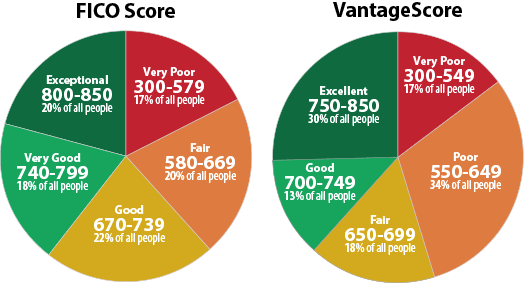Every lender checks your credit score to make sure how likely you are to repay a loan or to settle your credit card debt. If your credit score is good, you will get a loan, most likely on good or very good terms. But how high a credit score should be to be considered a good one?

What Is Credit Score?
A credit score is a three-digit number, ranging from 300 to 850, which represents your creditworthiness. Simply put, it tells lenders what are the chances that you repay a loan. The higher the score, the more trustworthy you are.
Every credit score is based on your credit report, and a credit report – on your credit history. Credit report collects all information about your past debt, including all of the delays in payment.
source: YouTube channel: Wall Street
A Good Credit Score
The average credit score in the United States is around 687, and in the United Kingdom – 757 (based on data provided by Experian).
It is said, that if you have a score of 740 you will surely get a loan and you will get the best interest rates. Scores from 620 and below prohibit you from borrowing any money.
Every lender defines its own credit ranges. But the most known type of credit scores is FICO Score – it ranges from 300 to 850 and many lenders use it. In that case, a score above 670 is considered good, and

source: www.experian.com/blogs/ask-experian/credit-education/score-basics/what-is-a-good-credit-score/
What If Your Credit Score Is Poor?
If your rating is around 650-550 – you may have a problem with borrowing the money. Your credit score is considered just „fair” and in that kind of case granting a loan is risky for a creditor. You may be approved, but with a
If your rating is around 550-400 – it is considered poor. You may get a loan, but on as poor conditions, as your credit score is. It can be really
If your rating is around 300 and less, it is considered very poor. Applicants with that kind of rating won't be granted with any loan.
How To Improve Your Credit Score?
There are some ways to improve your credit score.
At first, you should know what affects your score:
- payment history – every late or missed payment affects your score badly,
- credit card utilization – high credit card balance lowers your score,
- length of credit history – the sooner you start building it, the better,
number of credit inquiries – applying for too many loans in a short period of time affects your score negatively.
If you want to improve your credit score, follow these steps:
Start paying your debt on time
Being on time with your repayments is crucial. Every delay will affect your credit score badly. You have to regain control of your money. Sum your incomes up and prioritize your bills and payments. Don't let yourself to spend money on whims. If a purchase can wait for a few months, you may have a chance to save some money for it. Don't act impulsively and try to be really responsible.
Start paying your bills on time
Many bills don't get reported to credit bureaus when you pay them on time, but every delay will surely get there. Often we don't realize that, but every delinquent payment has a negative impact on our credit score. It even includes small library fines.
Watch your credit card balances
Even if you pay your credit card bills on time, if your balance is high, it will negatively affect your rating! Your credit card balance should be within 30% of your limit. Card issuers report the balance when your statement closes and it affects your score negatively even if then you will pay everything on time
Author: Olga Gierszal
AT TIMETO YOU HAVE MANY WAYS TO MAKE MONEY


WITH YOUR BANK ACCOUNT

CHEAPEST LOAN



